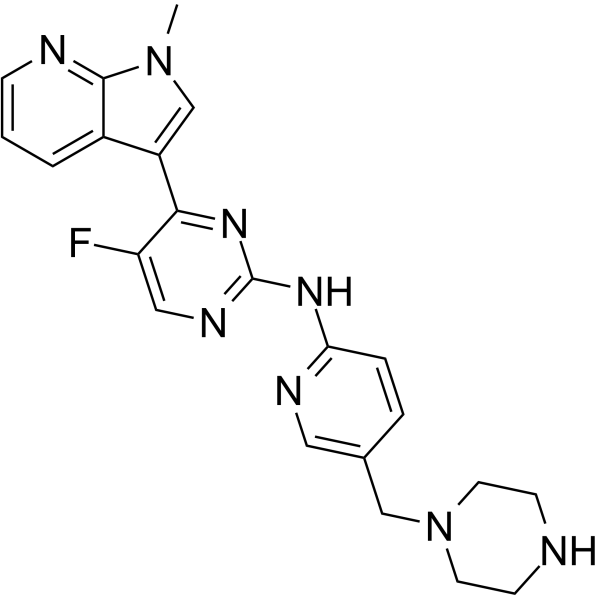| In Vitro |
CDK4/6-IN-10 (compouns 32) (1 µM) shows kinase selectivity with IC50s of 22 nM and 10 nM for CDK4 and CDK6, respectively[1]. CDK4/6-IN-10 (72 h) shows antiproliferative activity (GI50s of 2.028, 5.802, 2.286, 2.238, 1.526, 11.381 µM for RPMI-8226, U266, K562, HL-60, 22RV1, HEK-293 cells, respectively)[1]. CDK4/6-IN-10 (0, 1.5, 3, 6 µM, 24 h) induces cell cycle arrest at the G1 phase in a concentration-dependent manner[1]. CDK4/6-IN-10 ( 0, 1, 2, 3 µM, 24 h) induces apoptosis of RPMI-8226 cells in a concentration-dependent manner[1]. CDK4/6-IN-10 (0, 1.5, 3, 6 µM, 24 h) reduces the CDK4/6 activity by decreases the expression level of p-RB, c-MYC and BCL-2[1]. Cell Proliferation Assay[1] Cell Line: RPMI-8226, U266, K562, HL-60, 22RV1, HEK-293 cells Concentration: Incubation Time: 72 h Result: Shows antiproliferative activity (GI50s of 2.028, 5.802, 2.286, 2.238, 1.526, 11.381 µM for RPMI-8226, U266, K562, HL-60, 22RV1, HEK-293 cells, respectively). Cell Cycle Analysis[1] Cell Line: RPMI-8226 cells Concentration: 0, 1.5, 3, 6 µM Incubation Time: 24 h Result: Cells were arrested at the G1 phase in a concentration-dependent manner. Apoptosis Analysis[1] Cell Line: RPMI-8226 cells Concentration: 0, 1.5, 3, 6 µM Incubation Time: 24 h Result: Reduced the CD4/K activity by decreased the expression level of p-RB, c-MYC and BCL-2.
|
| In Vivo |
CDK4/6-IN-10 (1000, 5000, 10000 mg/kg; p.o.) shows safety profile with LD50 much higher than 10,000 mg/kg[1]. CDK4/6-IN-10 (10 mg/kg; p.o.) shows oral bioavailability (F=51%) in SD rats[1]. CDK4/6-IN-10 (100, 200 mg/kg; p.o., once a day for 19 days) shows antitumor potency and favorable safety profile[1]. Pharmacokinetic Parameters of CDK4/6-IN-10 in SpragueeDawley rats[1]. Compd Admin. Cmax (ng/mL) AUC0-t (h·ng/mL) MRT0-t (h) Tmax (h) t1/2 (h) CL (mL/h/kg) F (%) 32 i.v. 355 960 5.9 0.033 8.9 641 - p.o. 257 4,878 12.8 10.7 >24 524 51SpragueeDawley rats, 10 mg/kg, p.o. Animal Model: ICR mice[1] Dosage: 1000, 5000, 10000 mg/kg Administration: p.o. Result: Showed safety profile with LD50 much higher than 10,000 mg/kg. Animal Model: SpragueeDawley rats[1] Dosage: 10 mg/kg Administration: p.o. Result: Showed oral bioavailability (F=51%). Animal Model: BALB/c nude mice (6-8 weeks) (MM xenograft model)[1] Dosage: 100, 200 mg/kg Administration: p.o., once a day, 19 days Result: Showed antitumor potency and favorable safety profile.
|
